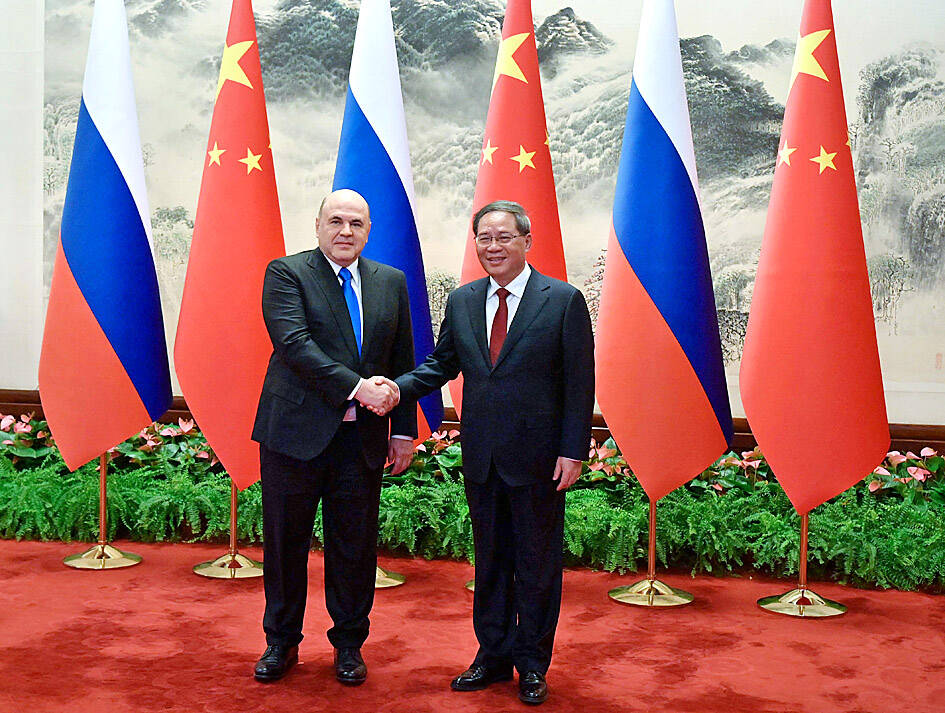Russian Prime Minister Mikhail Mishustin yesterday hailed “unprecedented” relations with China despite sanctions pressure from the West as he met with his counterpart in Beijing.
Mishustin arrived in China on Monday, attending a business forum in Shanghai on Tuesday before traveling to Beijing to meet Chinese President Xi Jinping (習近平) and Chinese Premier Li Qiang (李強).
It is the highest-level visit by a Russian official to China since Moscow invaded Ukraine last year.

Photo: AFP
“Today, relations between Russia and China are at an unprecedented high level,” Mishustin told Li after a welcoming ceremony outside Beijing’s Great Hall of the People. “They are characterized by mutual respect of each other’s interests, the desire to jointly respond to challenges, which is associated with increased turbulence in the international arena and the pressure of illegitimate sanctions from the collective West.”
Li hailed the “comprehensive strategic cooperative partnership between China and Russia in the new era.”
“I believe your trip to China this time will definitely leave a deep impression,” he said.
Li said that bilateral trade had already reached US$70 billion so far this year.
“This is a year-on-year increase of more than 40 percent,” he said. “The scale of investment between the two countries is also continuously upgrading. Strategic large-scale projects are steadily advancing.”
Following the talks, ministers signed a series of agreements on service trade cooperation and sports, as well as on patents and Russian millet exports to China.
Mishustin is in China with top officials, including Russian Deputy Prime Minister Alexander Novak, who handles energy policy.
China last year became Russia’s top energy customer as Moscow’s gas exports otherwise plummeted due to a flurry of Western sanctions over the invasion of Ukraine.
Russian state media reported that Novak on Tuesday told a forum in Shanghai that Russian energy supplies to China would increase by 40 percent year-on-year this year.
Analysts say that China holds the upper hand in the relationship with Russia and that its sway is growing as Moscow’s international isolation deepens.
The leaders of both countries are “brought together more by shared grievances and insecurities than by shared goals,” said Ryan Hass, a senior fellow at Washington’s Brookings Institution and a former White House official. “They both resent and feel threatened by Western leadership in the international system and believe their countries should be given greater deference on issues implicating their own interests.”

The CIA has a message for Chinese government officials worried about their place in Chinese President Xi Jinping’s (習近平) government: Come work with us. The agency released two Mandarin-language videos on social media on Thursday inviting disgruntled officials to contact the CIA. The recruitment videos posted on YouTube and X racked up more than 5 million views combined in their first day. The outreach comes as CIA Director John Ratcliffe has vowed to boost the agency’s use of intelligence from human sources and its focus on China, which has recently targeted US officials with its own espionage operations. The videos are “aimed at

STEADFAST FRIEND: The bills encourage increased Taiwan-US engagement and address China’s distortion of UN Resolution 2758 to isolate Taiwan internationally The Presidential Office yesterday thanked the US House of Representatives for unanimously passing two Taiwan-related bills highlighting its solid support for Taiwan’s democracy and global participation, and for deepening bilateral relations. One of the bills, the Taiwan Assurance Implementation Act, requires the US Department of State to periodically review its guidelines for engagement with Taiwan, and report to the US Congress on the guidelines and plans to lift self-imposed limitations on US-Taiwan engagement. The other bill is the Taiwan International Solidarity Act, which clarifies that UN Resolution 2758 does not address the issue of the representation of Taiwan or its people in

US Indo-Pacific Commander Admiral Samuel Paparo on Friday expressed concern over the rate at which China is diversifying its military exercises, the Financial Times (FT) reported on Saturday. “The rates of change on the depth and breadth of their exercises is the one non-linear effect that I’ve seen in the last year that wakes me up at night or keeps me up at night,” Paparo was quoted by FT as saying while attending the annual Sedona Forum at the McCain Institute in Arizona. Paparo also expressed concern over the speed with which China was expanding its military. While the US

SHIFT: Taiwan’s better-than-expected first-quarter GDP and signs of weakness in the US have driven global capital back to emerging markets, the central bank head said The central bank yesterday blamed market speculation for the steep rise in the local currency, and urged exporters and financial institutions to stay calm and stop panic sell-offs to avoid hurting their own profitability. The nation’s top monetary policymaker said that it would step in, if necessary, to maintain order and stability in the foreign exchange market. The remarks came as the NT dollar yesterday closed up NT$0.919 to NT$30.145 against the US dollar in Taipei trading, after rising as high as NT$29.59 in intraday trading. The local currency has surged 5.85 percent against the greenback over the past two sessions, central